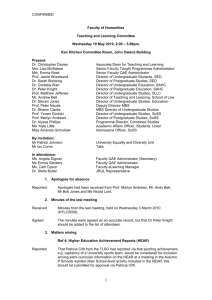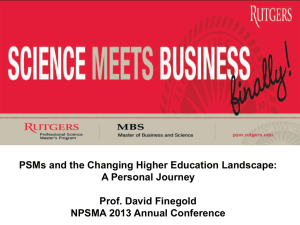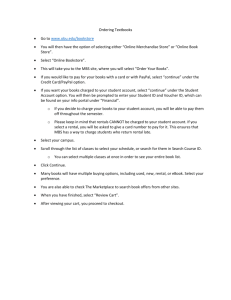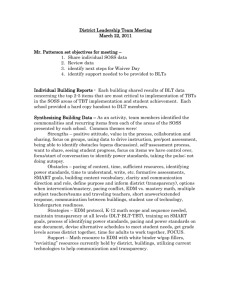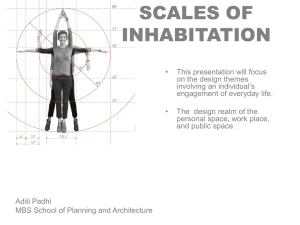Wednesday 22 April 2015 meeting
advertisement
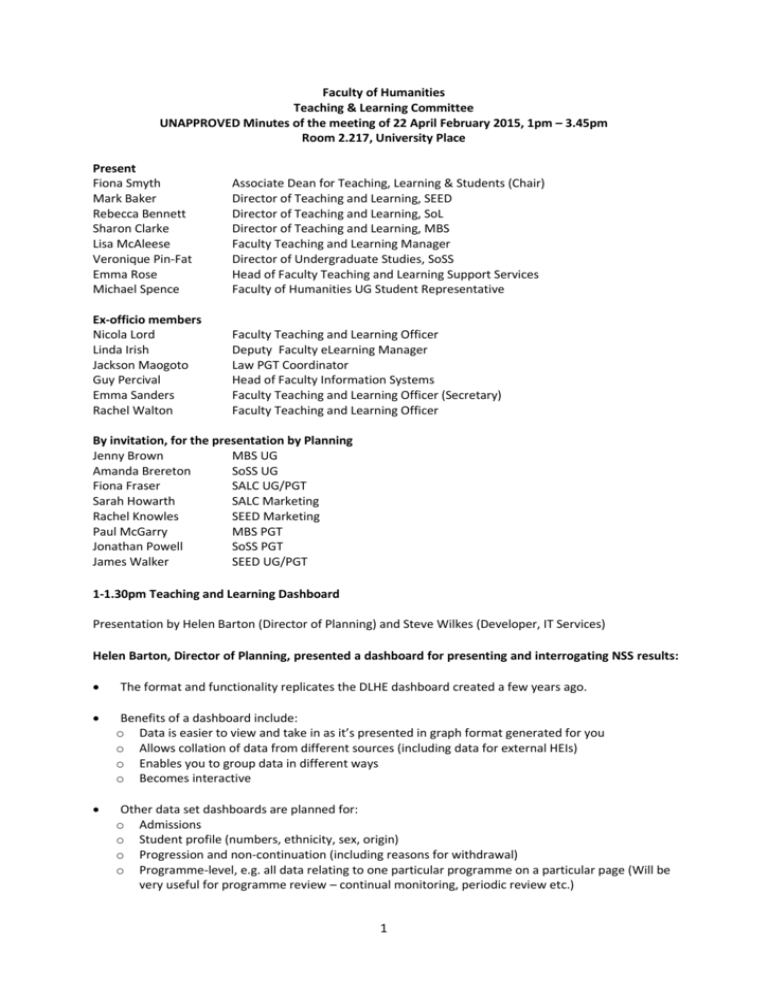
Faculty of Humanities Teaching & Learning Committee UNAPPROVED Minutes of the meeting of 22 April February 2015, 1pm – 3.45pm Room 2.217, University Place Present Fiona Smyth Mark Baker Rebecca Bennett Sharon Clarke Lisa McAleese Veronique Pin-Fat Emma Rose Michael Spence Associate Dean for Teaching, Learning & Students (Chair) Director of Teaching and Learning, SEED Director of Teaching and Learning, SoL Director of Teaching and Learning, MBS Faculty Teaching and Learning Manager Director of Undergraduate Studies, SoSS Head of Faculty Teaching and Learning Support Services Faculty of Humanities UG Student Representative Ex-officio members Nicola Lord Linda Irish Jackson Maogoto Guy Percival Emma Sanders Rachel Walton Faculty Teaching and Learning Officer Deputy Faculty eLearning Manager Law PGT Coordinator Head of Faculty Information Systems Faculty Teaching and Learning Officer (Secretary) Faculty Teaching and Learning Officer By invitation, for the presentation by Planning Jenny Brown MBS UG Amanda Brereton SoSS UG Fiona Fraser SALC UG/PGT Sarah Howarth SALC Marketing Rachel Knowles SEED Marketing Paul McGarry MBS PGT Jonathan Powell SoSS PGT James Walker SEED UG/PGT 1-1.30pm Teaching and Learning Dashboard Presentation by Helen Barton (Director of Planning) and Steve Wilkes (Developer, IT Services) Helen Barton, Director of Planning, presented a dashboard for presenting and interrogating NSS results: The format and functionality replicates the DLHE dashboard created a few years ago. Benefits of a dashboard include: o Data is easier to view and take in as it’s presented in graph format generated for you o Allows collation of data from different sources (including data for external HEIs) o Enables you to group data in different ways o Becomes interactive Other data set dashboards are planned for: o Admissions o Student profile (numbers, ethnicity, sex, origin) o Progression and non-continuation (including reasons for withdrawal) o Programme-level, e.g. all data relating to one particular programme on a particular page (Will be very useful for programme review – continual monitoring, periodic review etc.) 1 In addition, Emma Hilton-Wood is leading a project to look at a dashboard for one particular student (i.e. Academic Advising) Steve Wilkes, Developer, IT Services, demonstrated the format and functionality of the dashboard: Login - for access: email steven.wilkes@manchester.ac.uk A “trending” tab presents data across years, as well as global data within a single year Filters enable you to drill down to: Faculty/School/Division/Subject Area. (The University “global” trend remains so that local performance can be benchmarked against the University’s performance overall). You can see in chart form the number of students who rated each NSS question 1-2 (green), 3 (amber) and 4-5 (red). The amber “neither/nor” responses are sometimes significant, which the bar charts highlight. To export data into reports or committee papers you can use “snip it” to cut-and-paste, or use the “Export” button at the bottom of the screen (but this exports just the raw data, not the formatting, so it must be reformatted manually). If there are refinements or extra detail we’d like, Planning would welcome feedback via Helen.barton@manchester.ac.uk AGREED: Circulate powerpoint slides to all attendees. Action: Emma Sanders AGREED: Planning will provide instructions on how to cut and paste graphs into documents for sharing with staff at committees, producing reports etc. Action: Steve Wilkes Faculty of Humanities Teaching & Learning Committee UNAPPROVED Minutes of the meeting of 22 April February 2015, 1pm – 3.45pm 1. Apologies Anna Verges-Bausili (eLearning Manager); Mark Elliot (SoSS PGT); Abigail Gilmore (SALC PGT); Paul Gratrick (Faculty Careers Officer); Matthew Jefferies (AAD TL&S); Elinor O'Connor (MBS PGT); Judy Zolkiewski (AAD TL&S). 2. Minutes of the last meeting APPROVED 3. Actions and matters arising from the minutes of the last meeting of 18.02.15 None. 4. Annual Report on Appeals and Complaints 13/14, by Damien Tolan and Brenda Sanderson Received [HTLC/5/14/4] Noted: The report dealt with “formal” Appeals and Complaints, i.e. those that had been brought to Faculty. Complaints The number of Complaints received in 13/14 returned to “normal” (between 13 and 15) after an anomalous increase to 24 in 12/13, the reasons for which are unclear. 2 In 13/14 Complaints were about warnings about potential disciplinary action, University policies and procedures, miscalculation of fee refunds, alleged exam disturbance, communication of results, and allegations of bullying, harassment and discrimination. Faculty upheld only 2 out of the 15 complaints submitted. Appeals The report highlighted a rise in Appeals in 13/14 at UoM (123, from 104 in 12/13). This rise was mirrored across the Sector. Supposed reasons for the rise in appeals include: o Greater competition for graduate jobs plus perceived fall in status of a 2:2 degree; o Greater awareness of complaints and appeals procedures amongst students; o The OIA has raised its profile by publicising cases and ‘naming and shaming’ non-compliant universities; o The new fee regime means students may increasingly see themselves as consumers and demand ‘value for money’. The majority of Appeals (95) were rejected by Faculty. 28 Appeals were upheld. Faculty uphold the Appeals having taken advice from experts including the DSO, General Counsel etc. 21 of the 95 students whose Appeals were rejected requested a review of the Faculty’s decision at the final stage of the University procedure. 1 appeal was upheld, the rest were rejected. Recommendations – see Section 4. i. Appeals relating to conditions which could be classed as a Disability Students who disclose conditions which could be classed as a disability to the School either on a one to one basis or via the Mitigating Circumstances Procedure should always be referred to the DSO for assessment. Processes for doing this will be different across Schools. ii. Retrospective evidence If retrospective evidence is submitted which provides a medical diagnosis of a condition which might have affected performance, and there is also good reason for non-disclosure (for example the condition could not be known or shown before), then consideration should be given to providing a further attempt at affected assessments. iii. Appeals against exclusion When students fail to meet progression requirements, Boards of Examiners’ minutes must always convey discussion of the options that took place, with reference to the options set out in paragraph 11 of the Undergraduate Degree Regulations and the student’s mark profile: Case handlers have to be sure that academic judgements are made and exercised in accordance with the regulations. iv. Delays in processing appeals The Faculty is working with TLSO to identify if the process can be lengthened, or if less time can be permitted for student response. v. Communication of Programme / Assessment Requirements It is important that School’s detail Programme and Assessment requirements clearly and in writing. Verbal communication of deadlines or the publication of deadlines in Powerpoint presentations is not sufficient. 5. Chair’s report 5.1 Verbal report from the Associate Dean (Teaching, Learning and Students) 3 JustFest, Thursday, 23 April 2015. Discussed: o How to increase student participation in the Humanities’ “Social Justice” strand of the University’s Grand Challenges programme – although this was the first, pilot year, only 150 L2 students had signed up, against a target of 500. Next year’s target was 1,500 L2 students, to come from across the University. o Staff and students felt that the timing of JustFest is bad as it clashes with assessment deadlines including UG dissertation deadlines. o It was suggested that the Ethical Grand Challenges programme should be held in Reading Week instead, but there is no agreed date for Reading Week and the other Faculties do not necessarily even have Reading Week. Reading Week is not an official part of the University’s calendar. o There was objection to the fact that, for the L1 Sustainability strand, Tuesday of Welcome Week is being taken over. Consequently so Schools cannot get rooms for their own induction activities (the importance of which the University has recently highlighted). SoSS do not approve of this timing or of its prioritisation. o In future, if all lectures are cancelled to make room for JustFest, potentially 1/10th of each course is lost or has to be made up elsewhere. o There was opposition to what seemed to be a curriculum being imposed from the top down, both on academic grounds and also because we are increasingly making demands on students in all sorts of areas, e.g. volunteering, leading societies and student groups to improve employability, working to fund education etc. The International Mobility group has asked for a PSS and an Academic representative to look at support for students abroad. Nominated: Academic: Wiebke Brockhaus-Grand (Residence Abroad in SALC) PSS: Sue Fidalgo (MBS International Coordinator – Undergraduate). A paper would come for discussion at next HTLC on 10th June proposing to a) merge UG and PGT Sub-Committees and b) hold these meetings monthly, to keep Programme Approvals moving quickly. International Study Routes – the possible introduction of International Study routes to all UG programmes was being explored centrally. 5.2 *Briefing Note Received [HTLC/5/14/5.2] 6 Student Matters Reported: Congratulations to Michael Spence, who had been nominated as the UMSU Education Officer for 15/16. 7 Report on MOOCs and Distance Learning Tabled: Paper from Matthew Jefferies on the University’s Strategy for MOOCs and DL. 7.1 DL expansion strategy The University has approved a major, “aggressive” expansion of its DL presence, following the report of a small ‘Task and Finish’ group last year. 4 7.2 External Partner - Pearson The ‘Task and Finish’ group report also came out in favour of working with an external partner rather than going it alone, so after a tender process which attracted a lot of general interest but only one firm bid, the University has chosen Pearson as its partner. The University hopes to begin the partnership with three programmes (chosen from a shortlist of 5), and with a projected start date of Sept 2016: - Public Health Project Management Health Care Law and Ethics / International Law? t.b.c. Although these programmes are centrally backed, it has been confirmed that they must go through the same Faculty-led approval processes as any other new programme. All students registered on these DL programmes will be entered onto existing student records systems and will have access to existing student services. 7.3 University Director of Distance Learning – Prof. Pam Vallely Prof Pam Vallely (MHS) has been appointed as the University’s Academic Director for Distance Learning. She will act as the interface between the University and Pearson and head up a small central team, including elearning technologists, to develop materials for the Pearson-backed programmes. A University DL oversight group will be established which will consist of an Operations Manager and university staff from the following areas – eLearning, IT and Finance. 7.4 Online Learning Strategy Group It has been decided to merge separate strategy groups for Campus-based eLearning (the Online Education Strategy Group) and for DL (the Online Education Strategy Group) into a new Online Learning Strategy Group, which will meet for the first time this summer. 7.5 MOOCs The first Manchester MOOCs went live in 2014 on the Coursera platform, including two from our Faculty - Water Management and Sanitation (MBS and SEED) - Global Health and Humanitarianism (HCRI) Water Management and Sanitation was judged the most successful of the first tranche of Manchester MOOCs, both in terms of numbers and in addressing the University’s Social Responsibility agenda (a high proportion of the sign-ups were from developing countries). (Although Prof. Taithe of HCRI has reported that some MOOC students subsequently commenced PGT study at UoM). DLSG recently approved a second tranche of Coursera MOOCs, including a second instalment of Water Management and three brand new MOOCs, including another one from MBS called Principles of Responsible Management. The University has also signed a contract with another MOOC platform, the UK-based FutureLearn, which will attract a predominantly UK market, and will be looking to offer at least two MOOCs here in the next year or so too. Discussed: Pearson may be able to help Schools with market research into DL but that’s about all, unless it’s one of the 3 central DL flagship programmes. These University DL programmes are much bigger 5 in scope, with student numbers hoping to run in the hundreds rather than those which Schools normally run therefore at this stage there is not expected to be a change in the normal process. If Schools wish to submit a programme proposal for a new DL programme, they too will need to go through the normal proposal process, even if they wish to have the University manage them. AGREED: Clarify whether MOOC proposals can still be submitted to whom, how, when. Action: Rachel Walton AGREED: Feed back to MadLEN (or equivalent) that communication about DL and Pearson’s (strategy, process etc.) must be improved. Action: Rachel Walton 8 Consultation on Draft Policy on Marking (version 2) (Lisa McAleese) Received: Results of consultation within Schools on the following documents, circulated to Teaching and Learning Directors by Lisa McAleese on 03/03/15: o o Draft Policy on Marking (version 2) [HTLC/5/14/8.1] New Policy on Marking – Faculty Executive Summary questions [HTLC/5/14/8.2] Discussed: Definitions: The paper defined separate roles of (para 3.1) “’Academic Unit Lead’ (the person appointed by the Examination board to oversee the assessment for a unit and produce the model/expected answers)” and (para 3.2) “’Internal Examiner’ (first marker, appointed by the Academic Lead. Marks in accordance with the model/ expected answers and the marking scheme)” AGREED: The roles of Academic Unit Lead and Internal Examiner will usually be undertaken by the same person, and this should be acknowledged in the paper. Internal Examining: Para. 4.4 states that “All assessment tasks must … be accompanied by an ‘indicative answer’ for the purposes of internal examining and review by an internal/ external moderation.” This is a significant change to the current Policy on Marking (“… it is helpful for each task to be supported by appropriate guidance on the expected answer and what would constitute different levels of performance. The extent to which this is practical will depend on the discipline, but in any case it is necessary when the setter is new to teaching, when there are multiple markers of the same task or when an External Examiner requests it”). AGREED: HTLC would strongly oppose the requirement to provide an indicative answer in 4.4 this because, although MBS and Law currently follow this practice anyway, it is not appropriate for a) small courses or b) more discursive courses. It furthermore encourages an idea that there is “the answer”, which is pedagogically/ intellectually unhelpful. Internal Moderation Re: Para 6.3 a) “In cases where a students has not followed set instructions on an examination paper and has answered an incorrect number of questions or failed to answer a compulsory question, the following is advised: a) where a student has attempted too many questions, academic judgment should be used to decide which answers to mark and which should be disregarded.” AGREED: 6 Markers should mark ALL answers then award with the best mark, in the interests of the student. AGREED: The University must provide a definition of moderation. Sample for moderation by the External Examiner: It is proposed to insert a maximum number of items in a sample and colleagues were asked to advise on an appropriate maximum figure for paragraph 7.1 on Internal Moderation “Once internal examining/ first marking has taken place the internal moderation will normally take the form of moderation of a sample of 20%, through the full range of marks awarded, which amounts to no fewer than 10 scripts and no more than XX.” Discussed: MBS currently require a sample of 10%, while SoSS’s sample size is 30%. AGREED: 10 scripts was too low to enable adequate moderation. HTLC proposed that moderation should be undertaken of a sample consisting of no fewer than 10 scripts and no more than 40 scripts, unless the number of multiple markers necessitates that more scripts are included in the sample in order to effect sound moderation of marking. Word Count Penalties: Clarification is required on whether penalties for word counts (+ or -) should be included in the Policy on Marking, particularly as the policy makes recommendations for penalties were a student has not complied with examination rubric in paragraph 6.3. Noted: Grademark doesn’t allow a word count that excludes footnotes etc. AGREED: Feed back to TLSO that Humanities currently has various practices on Word Count Penalties across Schools and if the University would like to develop a consistent practice we would welcome it for consideration. HTLC felt that a word count which falls significantly short of the specified word count should not be subject to a penalty as such work is likely to be self-penalising, i.e. it will lost marks because it fails to deal with the subject in sufficient depth. Action: Lisa McAleese Confirmed: Policy to be implemented for the new cohort in 15/16 (i.e. not for resits or for PGTS in Nov 2015) 9 Consultation concerning Resubmission of PGT Dissertations [HTLC/5/14/9] Discussed: Whether or not there is any appetite to revert back to the pre-2012 practice that students with a mark below 40% for the dissertation would not (normally) be permitted a resubmission. NB: any change would require approval by Senate. Law On balance it was proposed to stick with the current regulations and allow a dissertation resubmission whatever the original mark 7 SEED Opinion was split 50/50. MBS Staff are generally in favour of students having to achieve 40-49 on first submission (and MBS had retained this through special dispensation from the 2012 regulations)! ALC Propsosed to stick with the current regulations and allow a dissertation resubmission whatever the original mark. SALC Validated Partners o Sotheby’s Institute of Art, London: Within the Quality Team there is a clear consensus that the pre-2012 regulations were stronger on this point. In our experience very few dissertations are awarded below 40% and when it does happen it is not always a kindness to the student, or in any case appropriate, to allow students a referral opportunity if their dissertation is perceived to be beyond help. o Rose Bruford College: would support a return to pre-2012 practice regarding PGT dissertation resubmissions. o Cliff College: Support the current regulations. o Spurgeon’s College: It is good that students with a mark below 40% for the dissertation are not normally permitted a resubmission. The pre-2012 regulation made sense. o Luther King House: Inclination is be to remain with the current, post-2012 regulations, but not strong feelings either way. SoSS Apologies received from Mark Elliot. It was reported that the VP (Teaching, Learning and Students) was not in favour of “normally” being reintroduced to the regulations, as a compromise position. AGREED: Report to TLG that Humanities did not agree to a change to the 2012 Regulations. Action: Fiona Smyth 10 Mark Review (Lisa McAleese) Received: Faculty of Humanities - Mark Review Practice [HTLC/5/14/10] Noted: In response to requests from T&L Directors, Faculty TLO had put together a small working group to look at Mark Review agree practice. This paper is the result, and takes account of guidance from the VP (Teaching, Learning and Students) that Mark Review must not result in the creation of a sub-set of regulations or hurdles. APPROVED Circulate Faculty Guidance on Mark Review to T&L Directors and T&L Managers, and put a copy of TLO website. Action: Lisa McAleese 11 Report by Runnymede Trust Report on BME Attainment, “The educational experiences of Black and minority ethnic students at Manchester University”, commissioned by SoSS (Veronique Pin-Fat) 8 Received: o o Summary of Findings [HTLC/5/15/11.1] Full Report [HTLC/5/15/11.2] (48 pages) Reported: Runnymede Trust had been commissioned to write the report by Dr. Veronique Pin-Fat and Prof. Claire Alexander, SoSS’ Lead for Social Responsibility, who researches on race. The key question was ‘how does provision disproportionately affect BME students’? The issue of BME attainment affects all areas of the University and the sector, but as a School of Social Science, SoSS had an added interest in wanting to research this. However, the report is naturally very SoSS-specific in some areas. o SoSS School-level actions: BME staffing targets have been set – BME students don’t currently see themselves represented by the academy. At a SoSS Away day in July 2014 SoSS had agreed to institute unconscious bias training for all staff. Catherine Tansey, HoSA, sourced some online training which the Senior Executive Group in SoSS are completing doing to see whether it is fit for purpose. The expectation is that the training may need some tweaks before it is rolled out. BME is a Standing Item on the School Agenda (x 4 meetings per annum). Student Reps will also get unconscious bias training. Teaching Assistants will get unconscious bias training in School. o o o o o Devolved actions: Each Discipline Area is to look at the implications of the report for their particular area, their particular practices, and must develop its own strategies, e.g. Sociology had amended their Academic Advising practice to allow students to make an appointment to speak by phone rather than coming in for a face to face meeting. Action needs to filter right down, even into the reading material selected for inclusion on reading lists. Discussed: Attainment is one of the things we are asked to report on as a Faculty this year through APR, so would be useful if Vero could ask DAs to report what actions they have been taking. PRETS – pre-arrival activity. After confirmation, intending students can have access to the first two weeks of BB units, so that they can take a look, and have the Programme Director’s details. The aim is to make the transition to University less intimidating and to both reduce the need for new students to ask for help as well as to feel more able to ask for help. SoSS have a Youtube channel which outlines all course unit options. Students like to watch these around course unit selection time – it is less intimidating than seeing staff face to face and students can re-watch, compare, make short-lists etc. 12 University Penalties for Late Submission Received: paper from the TLSO on the desirability of a common, University-wide approach to penalties for late submission, zero tolerance or sliding scale [HTLC/5/14/12] Noted: Faculty had agreed a couple of year ago to a sliding scale, but had established a small working group to resolve difficulties and inconsistencies around implementation. 9 Discussed: The TurnItIn timestamp on online submissions means there is no scope for applying judgment as to whether a student has actually had an unfair advantage – 1 minute late means it IS LATE. Hard copy submission allowed for some discretion. Student Reps and the Students’ Union had said to leave it to individual Schools to decide on a sliding scale or zero tolerance, although Humanities students did not favour zero tolerance. AGREED: HTLC supported a sliding scale rather than zero tolerance, and want guidance on implementation. AGREED: Where a piece of work is submitted late, but fails only due to application of the lateness penalty, Schools should treat the original as a resubmission, and award the capped mark as per the 2012 regulations. 13 Feedback – Progress Report from Faculty TLSS Project Received: Progress Report on Faculty Feedback Project and recommendations for discussion [HTLC/5/14/13] Reported: The Teaching and Learning Office (TLO) is currently interrogating the Unit Survey data to identify those units with 25% (+) respondents which have achieved a score 4.3 (+) for Question 2. It is intended that a number of the staff, identified under paragraph 2.1, will be invited to a lunchtime session, chaired by the Associate Dean to discuss the following questions: Questions for Academic Staff What kinds of feedback do you provide for your students? What are you trying to achieve when you provide feedback? What are your thought processes when you are providing feedback? Do you have explicit ILOs for your assessment tasks? Do you look at the ILOs for a module when you come to set and mark a piece of work? Do you have marking criteria/descriptors in front of you when you mark? Why/why not? Do you think about the language you use in your feedback? Do you think it would always be clear to students what you mean? Is the feedback you give for formative assessment different to that for summative assessment? If so why? Do you set expectations at the beginning of your course as to how and when your students will receive feedback? How do you deliver your feedback, i.e. what is the method of delivery? Beyond the obvious examples of giving coursework back, do you think that students would clearly be able to tell us what other forms of feedback you provide? Is it obvious? Do you think feedback has to be accompanied by a mark? If you had to identify one thing which accounts for the high score you received in the unit survey that your feedback was helpful, what would that be? A similar session will be held for the Faculty’s Student Union Student Representatives. The paper proposes that the following proposed questions 3 will be posed to this group: Questions for Students What kinds of feedback do you receive? What is the best piece of feedback you have ever received and what made it the best? 10 What is the best feedback you have received in a module and why? What do you think is unhelpful feedback, and why? When you get feedback on an assignment what do you do with it? Do you just look at the mark? Do you read the feedback? Do you review the feedback from previous assignments before you start the next? How do you use past feedback to actually improve your next piece of work? What do you think academics in your discipline are most concerned about when they mark your work? Do you think students are actually aware of what they are being marked on? Do you understand the language used in the feedback you receive, e.g. ‘more critical reflection needed’ or ‘lacks application of theory’? Are you aware of any differences between the feedback you get for work that contributes to your end of year mark and work that is intended just to help you improve before final assessments? Do you use the feedback any differently? Are you aware at the beginning of your course how and when you will receive feedback? How do you prefer your feedback to be delivered? Do you know when you are getting feedback, other than when you receive written feedback on an essay? How valuable to you is feedback which isn’t accompanied by a grade or mark? If you had to identify one thing which makes feedback helpful what would that be? NB: The School of Social Sciences (SoSS) has undertaken a similar exercise at postgraduate taught level and is undertaking a similar exercise at undergraduate level, so the TLO will not be including SoSS staff in the project; the results from the School exercises will be shared with the Faculty. In July 2008 the Faculty produced guidelines on ‘mechanisms for providing feedback to students’1, it is intended that the qualitative data from the sessions detailed in paragraph 2.2 will be added to this document. APPROVED 14 Excluding students for non-preparation (Lisa McAleese) Received: the above paper for discussion and approval. [HTLC/5/14/14] APPROVED AGREED Circulate the Faculty paper on Excluding students for non-preparation to T&L Directors and Managers, and put on the TLO website. Action: Lisa McAleese 15 Interruption Requests Received: 15.1 Summary of requests granted by Schools - to Jan 2015 [HTLC/5/14/15.1] 15.2 Summary of requests granted by Schools - to March 2015 [HTLC/5/14/15.2] Secretary’s Note: SALC’s submission had been received 16 AP(E)L Requests (Accreditation of Prior (Experiential) Learning 1 http://www.humanities.manchester.ac.uk/tandl/policyandprocedure/assessment_feedback.html 11 Summary of requests granted by Schools – to March 2015 [HTLC/5/14/16] 17 Received for information 17.1 17.2 PAG Programme Proposal-Amendment Tracker [HTLC/5/14/17.1] The University’s TLSO Project Priorities 2014/15 [HTLC/5/14/17.2] 18 *Sub-Committee Minutes 18.1 *Undergraduate Committee N/A - next meeting will take place 20th May 2015 18.2 *PGT Committee 18th March 2015 (not yet available) 18.3 Technology in Teaching and Learning (TTL) 15th April 2015 (not yet available) 18.4 *Intake Management Group (IMG) Thursday 19 March 2015 (not yet available) 18.5 *Employability Sub-Committee 18.6 *Teaching and Learning Administrators Network (TLAN) 26th March 2015 (not yet available) 18.7 *Staff-Student Liaison Group 3rd December 2014 4th February 2015 18.8 *Peer Review Sub-Group 13th November 2014 (not yet available) Xth June 2015 18.9 *Appeals and Complaints Network N/A – dates to be confirmed 18.10 *Malpractice Network N/A – dates to be confirmed 18.11 *Portfolio Advisory Group March 2015 (not yet available) 19 A.O.B. Horizon-scanning Instead of the HTLC meeting planned for 8th July, it is proposed to get T&L directors, admissions officers and marketing managers together to discuss horizon-scanning and what Humanities’ portfolio should look like. 20 Date of Next Meeting Wednesday 10 June 2015, 2-4pm, Room 6.207, University Place 12 Distribution: Faculty Officers Dr. Fiona Smyth Prof. Matthew Jefferies Prof. Judy Zolkiewski Mrs. Lisa McAleese Mrs. Emma Rose Associate Dean for Teaching, Learning & Students Assistant Associate Dean for Teaching, Learning & Students Assistant Associate Dean for Teaching, Learning & Students Teaching and Learning Manager Head of Faculty Teaching and Learning Support Services Manchester Business School Prof. Sharon Clarke Director of Teaching & Learning School of Environment, Education and Development Dr. Mark Baker Director of Teaching and Learning School of Arts, Languages and Cultures Dr. James Garratt Dr. Abigail Gilmore Director of Undergraduate Education Director of Graduate Education School of Law Prof. Rebecca Bennett Director of Teaching and Learning School of Social Sciences Dr. Veronique Pin-Fat Dr. Mark Elliot Director of Undergraduate Studies Director of Postgraduate Studies Student representation (nominated by the Students' Union) Harriet Pugh Education Officer Cameron Austin Humanities UG Representative Michael Spence Humanities UG Representative Thom Elliot Humanities PGT Representative Ex-officio members: Dr. Ilias Petrounias Dr. Elinor O’Connor Ms. Norma Hird Dr. Jackson Maogoto Prof. Elaine Ferneley Mrs. Nicola Lord Ms. Emma Sanders Ms. Rachel Walton Ms. Anna Verges-Bausili Guy Percival Mrs. Katy Woolfenden t.b.c. MBS Director of Undergraduate Studies MBS Director of Postgraduate Studies School of Law Undergraduate Studies School of Law Postgraduate Taught Studies MBA and MPA Director, MBS Faculty Teaching and Learning Officer Faculty Teaching and Learning Officer (Secretary) Faculty Teaching and Learning Officer Faculty eLearning Manager Head of Faculty IS Library, Director of Teaching, Learning & Students Associate Dean for External Relations By invitation: Louise Walmsley Amanda Grimshaw Michelle Harper Jane Hallam Antoinette Perry Marie Gray Head of the Teaching and Learning Support Office (TLSO) Faculty Lead for Recruitment and Admissions Faculty Estates Officer Faculty Planning Officer Faculty Marketing Manager (Student Recruitment) Faculty Communications Officer For information to: Heads of School Administration Jayne Hindle – SALC Alison Wilson – School of Law Janine Ellis - MBS Catherine Tansey – SoSS (Not Rosie Williams, by request) - SEED School Teaching and Learning Managers Abi Robinson - Law Amanda Brereton (UG) - SoSS Bernadette O'Connor (PGT) - SoSS James Walker - SEED Janice Dodds (Student Support) - SEED Elizabeth Nolan - SALC 13 Fiona Fraser – SALC UG Kevin Little – SALC PGT Ashton Bamfield – SALC (Collaborative Partnership Administrative Officer) Sarah Featherstone (UG) – MBS Alison Walker-Twiste – MBS Head of Graduate Services Hilary Garraway (PGT) – MBS Jane Crombleholme – MBS Executive Education School eLearning Leads Neil Cobb - Law Karen Niven - MBS Liam Harte - SALC Gary Motteram - SEED Dan Rigby - SoSS Employability Leads Dinah Crystal – Law Penny Clarke – MBS Lindy Crewe – SALC Craig Blyth – SEED (MIE) Jennifer O’Brien – SEED (Geography) Veronique Pin-Fat – SoSS 14
